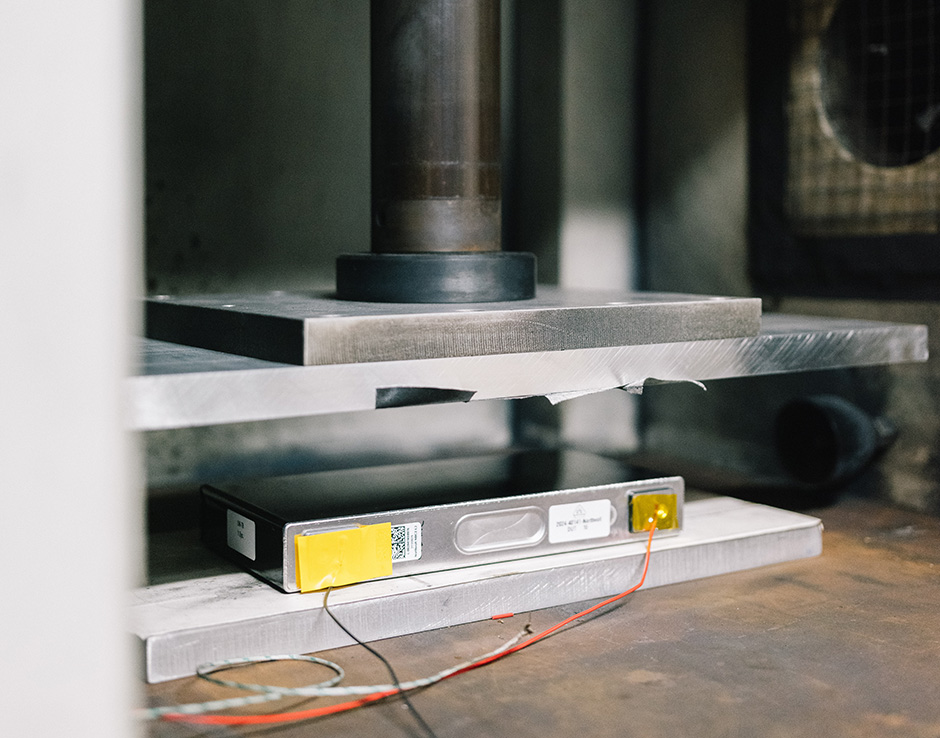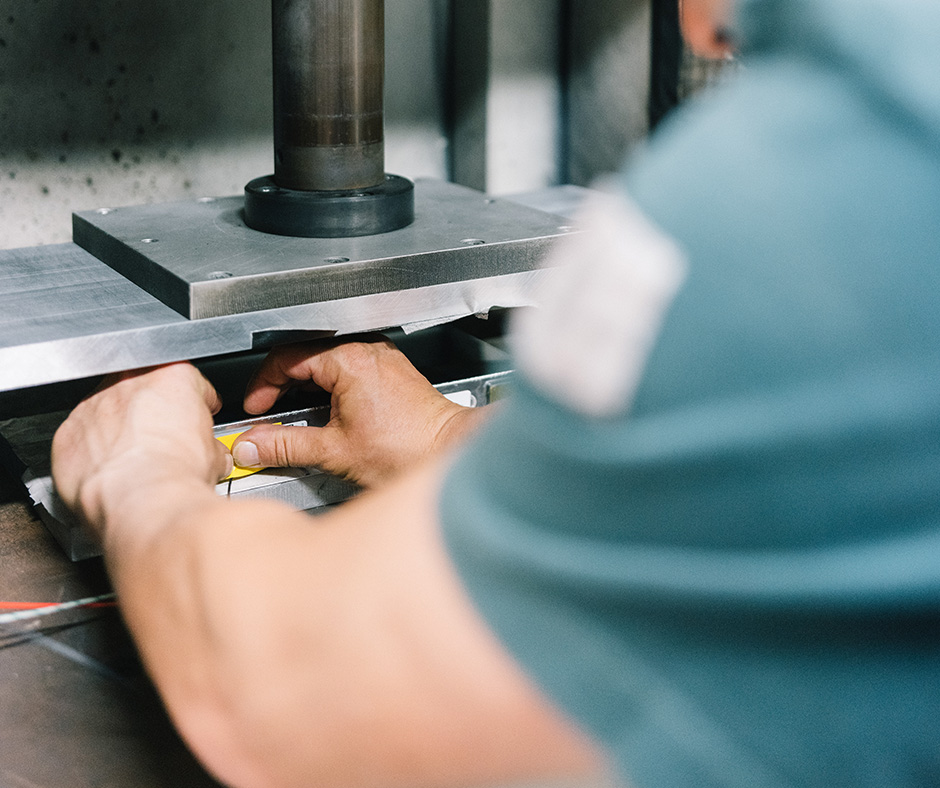UN 38.3

IMPORTANT IN BRIEF
UN 38.3
UN 38.3 is an international test standard that ensures that lithium-ion batteries and cells, as well as sodium-ion batteries and cells, meet the strict safety requirements for transport. It is one of the central regulations for the safe shipment of lithium batteries and is an essential prerequisite for the worldwide transport of these products. Chapter 38.3 of the United Nations Manual of Tests and Criteria defines eight specific individual tests that simulate transport conditions such as pressure, temperature, vibration and impact. Since 2020, a detailed test report has also been mandatory for all parties involved in the supply chain in order to prove conformity.
We are an independent and accredited testing laboratory specialising in UN 38.3 tests for lithium batteries. Our range of services includes all the necessary tests, including altitude simulation, thermal tests, vibration, shock, short circuit testing and more. We ensure that the tests are carried out under realistic conditions and comply with current legal requirements. Thanks to our extensive experience and state-of-the-art testing facilities, we offer you reliable and efficient testing of your lithium-ion batteries to ensure transportability and avoid delays or rejections by carriers.

What makes us the ideal partner for your UN 38.3 certification
Recognised test laboratory
Batteryuniversity is officially accredited by the German Accreditation Body (DAkkS) to carry out UN 38.3 tests and, as a certified test laboratory, offers comprehensive tests to ensure the transport safety of your lithium batteries. This enables you to ensure that your batteries are shipped worldwide in accordance with international dangerous goods regulations.
Extensive expertise
We have specialised in the testing and certification of lithium-ion batteries for over 15 years. Our expertise in the UN 38.3 standard and other relevant regulations guarantees you standard-compliant tests for various battery types and sizes.
Comprehensive test coverage
We carry out all the tests required for UN 38.3 in our state-of-the-art laboratory. This includes mechanical, electrical and safety-related tests that comply exactly with the requirements of the ‘Manual of Tests and Criteria’. Tests for external impacts such as pressure, shocks and short circuits are particularly important.
Fast market access
Thanks to our efficient test processes, you quickly receive reliable test results and the necessary evidence for the safe transport of your batteries. This helps you avoid delays and get your products to market faster.
Advanced laboratory technologies
Our test facilities are equipped with state-of-the-art measurement technology to deliver precise test results. We test small lithium button cells as well as high-performance industrial energy storage devices and battery packs.
Targeted test methods
Every battery has individual requirements. We customise our tests to your specific needs, regardless of whether they are batteries for portable devices, medical applications or industrial energy storage systems. Our test methods are based exactly on the standard specifications of UN 38.3.

The importance of UN 38.3 for the safe transport of lithium batteries
Lithium batteries are powerful, but also harbour potential risks, especially during transport. Mechanical damage, incorrect storage or extreme temperatures can lead to critical situations such as short circuits or overheating. UN 38.3 therefore prescribes extensive tests to ensure that batteries can withstand the stresses during transport. This standard is essential for manufacturers, retailers and logistics companies, as it serves as official proof of the safety and transportability of lithium batteries. Without successfully passed tests and a corresponding test summary, shipping can be refused by carriers.
As a DAkkS-accredited testing laboratory, Batteryuniversity accompanies you through the entire certification process of the UN test and ensures that your batteries fulfil all the prescribed safety requirements of UN 38.3.
Download DAkkS certificate
How to obtain your UN 38.3 certification
UN 38.3 certification is based on a structured test procedure that ensures that your lithium batteries comply with international transport regulations. First, our experts analyse the design, intended use and technical properties of your battery. On this basis, they determine which tests need to be carried out. Your batteries then undergo a series of standardised tests to ensure that they are suitable for transport. These transport tests include
T1: Height simulation
-
Testing the battery performance at reduced air pressure, as occurs in air transport
T2: Thermal test
-
Testing the battery under extreme temperature changes to ensure thermal stability
T3: Vibration test
-
Simulation of vibrations that can occur during transport
T4: Shock test
-
Testing resistance to sudden impacts and shocks
T5: External short circuit
-
Test for short-circuit risks from external metal objects
T6: Impact/crushing
-
Checking the stability of the batteries under high pressure load or mechanical impact (only for cells)
T7: Overload test
-
Ensure that the battery does not reach a dangerous state even when overcharged
T8: Forced discharge
-
Check whether an uncontrolled discharge leads to safety risks (only for cells)
These transport tests simulate realistic transport conditions and ensure that your batteries remain safe even under challenging circumstances. Once the individual tests have been completed, we prepare a test report and the necessary test summary, which documents all the results. Since 2020, this has been mandatory for all players in the supply chain and serves as official proof of compliance with UN 38.3. With successful certification, your batteries can be transported worldwide. We are also available to advise you after certification. Should there be any regulatory changes, we will inform you in good time and support you in continuing to bring your products to market in a compliant manner. Thanks to our efficient testing procedures, we reduce delays in the certification process and enable a smooth market launch.
FREQUENTLY ASKED QUESTIONS & ANSWERS
UN 38.3 is an international test standard that ensures that lithium-ion batteries and cells as well as sodium-ion batteries and cells fulfil the strict safety requirements for transport. It comprises eight standardised tests that simulate mechanical, electrical and thermal loads. Since 2020, a test summary has also been mandatory for all parties involved in the supply chain in order to prove conformity.
UN 38.3 and IEC 62281 are both standards designed to ensure the safety of lithium batteries during transport. UN 38.3 is an international test specification that prescribes eight specific tests to ensure that lithium batteries can withstand the stresses of transport. IEC 62281, on the other hand, is a standard issued by the International Electrotechnical Commission that specifies detailed test methods for primary and secondary lithium batteries. While UN 38.3 is mandatory for the transport of lithium batteries worldwide, IEC 62281 serves as a supplementary standard that helps manufacturers to minimise safety risks and meet additional requirements for specific markets.
UN 38.3 contains eight specific test methods that test the safety of lithium batteries under realistic transport conditions. These include tests for resistance to pressure changes, extreme temperatures, mechanical impacts such as vibrations and shocks as well as electrical loads such as short circuits, overcharging and forced discharge. These tests ensure that batteries can be transported safely even under demanding conditions.
All lithium-ion batteries and cells, as well as sodium-ion batteries and cells, regardless of their size or design, must pass the UN 38.3 tests in order to be approved for transport. This applies to both individual cells and complete battery units in electronic devices or industrial batteries.
Successful certification in accordance with UN 38.3 ensures that batteries can be transported worldwide, as they are considered safe. Without passing the tests, shipping can be refused by carriers. Certification also helps to fulfil legal requirements and minimise liability risks for manufacturers and retailers.
Batteryuniversity is an accredited test laboratory and officially recognised by the DAkkS for carrying out UN 38.3 tests. We offer all the necessary tests from a single source and have many years of experience in battery testing. Thanks to our modern laboratory technology and efficient test procedures, we enable fast and reliable certification for the safe transport of your batteries.
INFORMATION ABOUT THE AUTHOR
Alexander Roth
Alexander Roth is head of the test laboratory at Batteryuniversity and an expert in the testing and certification of lithium-ion batteries.







